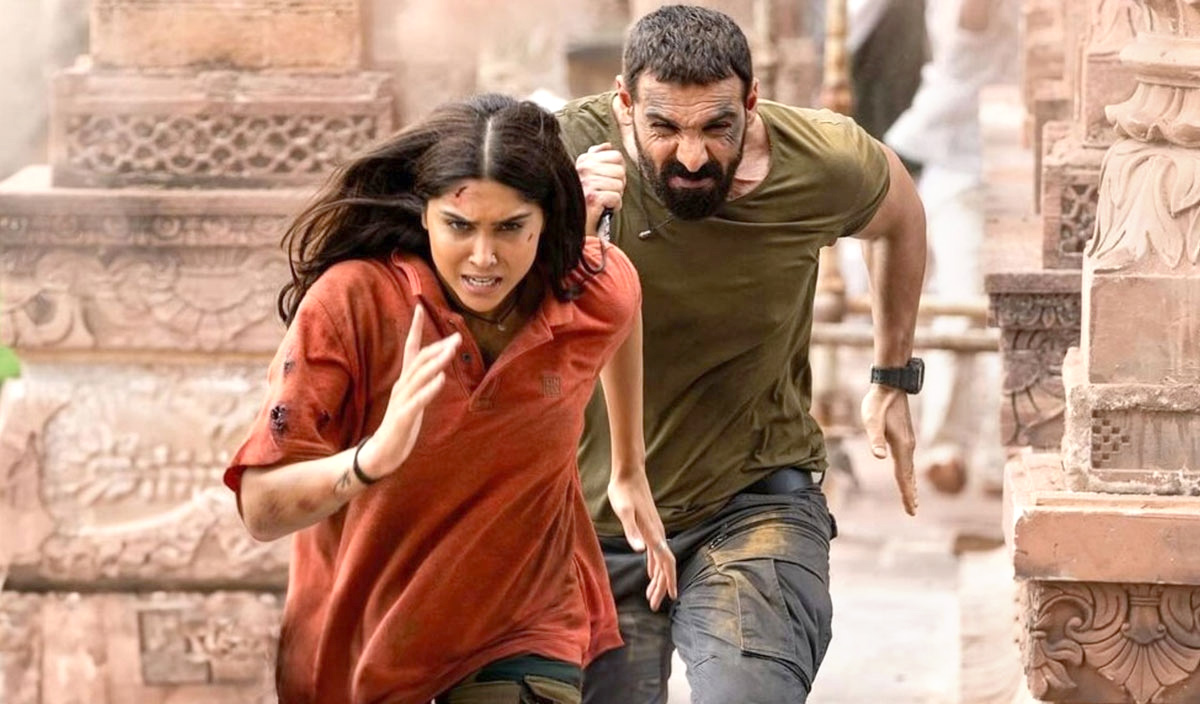Vedaa is realistic but also has the kind of mainstream elements and action sequences that make a film gripping, observes Deepa Gahlot.

The mood of the country, during Independence Day, is that of optimism. But there is a reality check when reports in newspapers portray a grim reflection of another reality -- violence against women, honour killings and rampant casteism.
Nikkhil Advani's Vedaa, written by Aseem Arrora, picks from the kind of depressing news that is all too frequent -- killing of a man or woman who marries outside the caste, reprisal rapes of sisters if their brothers elope with a high caste woman, oppression of the lower castes.
For most part, it is realistic but also with the kind of mainstream elements and action sequences that make a film gripping.
The laconic Abhimanyu Kanwar (John Abraham) arrives in Barmer after a court's martial and dishonourable discharge for disobeying orders in order to avenge his wife's (Tamannaah Bhatia) murder.
He is hired as an assistant boxing coach at the local college.
The town is ruled by Jitendra Pratap Singh (Abhishek Banerjee), who pretends to be progressive, but under the pleasant and reasonable demeanour is a feudal monster.
Vedaa (Sharvari) belongs to a Dalit family, studies law, and like the other women in the town, puts up with the harassment from Jitendra's nasty brother Suyog (Kshitij Chauhan) and his cronies, who misbehave with impunity and even record their antics.
When Vedaa wants to join the boxing class, she is first made to sweep and mop the gym to put her in her place. Then she is attacked for her persistence, her fee money torn up.
Abhimanyu sees the fire in her, and trains Vedaa on his own.
A horrific crisis engulfs Vedaa's family when her brother is caught romancing an upper caste girl.
Vedaa, her parents and sister are humiliated by Singh, and the rabid upper caste men let loose on them.
Vedaa escapes with the help of Abhimanyu, chased by the entire gang of murderous hoodlums and corrupt cops.
Stylish fight sequences are shot on picturesque locations, John moves with a feral grace that makes the violence palatable.
For all her courage and indomitable spirit, Vedaa insists that she wants to go to court.
A law student, who knows all the relevant acts and sections, is naïve enough to believe that justice is instantly dispensed.
The film that managed to evoke emotions of outrage and even sorrow at the cruelty inflicted on the marginalised, dissolves into absurdity with a prolonged carnage shot within court premises.
But the film is sincere in its condemnation of social evils, making a case of judicial intervention in putting an end to caste and gender based injustice entrenched in the system.
Jitendra is like so many educated men, who can quote from Darwin as well as the Mahabharat, and yet hold the antiquated view that caste is pre-ordained and cannot be challenged.
Vedaa may have been named after the female lead but it is a film designed for John Abraham's unique talent for action, and his selection of unblinking scowls.
When he says, 'I don't just fight, I go to war,' it is perfectly believable.
Rather early in her career, Sharvari has got a role that offers a proper character arc, and a chance to portray both emotional and physical strength.
Abhishek Banerjee is more menacing because he does not look like a movie villain is expected to -- he would lose a fist fight in an instant -- but his entitlement gives him power.
If there is something that is out of place in a film that talks of the dignity of women, it is a crude item number, which adds nothing to the narrative flow and detracts from the seriousness of the message.